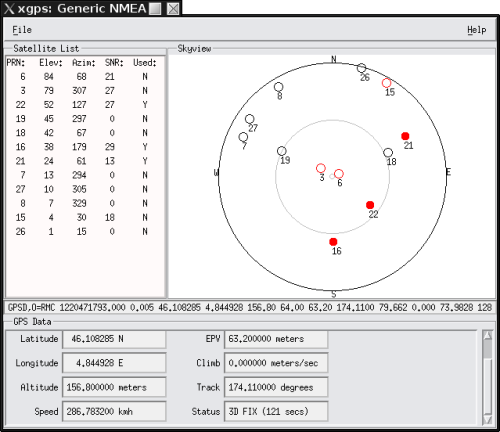Handling GPS data
Hardware
Be sure to purchase a unit that will broadcast NMEA compliant sentences. I chose the Globalsat BU-353 shown below. This is a USB device that obtains power through the USB, but also has an internal battery for short term memory. Plug the unit into your laptop and allow a few minutes to get a fix. The led will start blinking once a fix has been obtained. You will not need any of the software provided with the unit.
Software
Guile 1.8 a dialect of Scheme/Lisp
gpsd a gps daemon. You will want to install the software compiled for your system, e.g. on Arch use
>pacman -S gpsd gpsd-clients
Direct access to tty
By default your gps unit is assigned to /dev/ttyUSB0, but you should check to make sure:
>dmesg | grep -i USB [11250.384023] usb 4-2: new full-speed USB device number 2 using uhci_hcd [11250.669968] usbcore: registered new interface driver usbserial [11250.669991] USB Serial support registered for generic [11250.670030] usbcore: registered new interface driver usbserial_generic [11250.670033] usbserial: USB Serial Driver core [11250.673280] USB Serial support registered for pl2303 [11250.685151] usb 4-2: pl2303 converter now attached to ttyUSB0 [11250.685174] usbcore: registered new interface driver pl2303 [11250.685177] pl2303: Prolific PL2303 USB to serial adaptor driver
Set access, change the baud rate and put the GPS in NMEA mode. Look at some of the output:
>sudo chmod 666 /dev/ttyUSB0 && stty -F /dev/ttyUSB0 ispeed 4800 >cat /dev/ttyUSB0 $GPGSA,A,3,15,14,09,18,21,24,22,06,19,,,,1.9,1.2,1.4*36 $GPGSV,3,1,12,18,71,317,34,24,63,112,31,21,52,212,28,15,42,058,34*71 $GPGSV,3,2,12,22,37,301,28,14,21,250,24,09,07,035,21,19,06,316,13*73 $GPGSV,3,3,12,06,05,279,18,26,01,060,,03,01,294,,28,01,024,*7F $GPRMC,224355.000,A,1825.0332,N,02111.3093,W,0.13,134.34,050513,,,A*75 $GPGGA,224532.000,1825.0301,N,02111.3093,W,1,08,1.3,39.8,M,-73.7,M,,0000*25 $GPGSA,A,3,15,14,09,18,21,24,22,06,19,,,,1.9,1.2,1.4*36 $GPRMC,224356.000,A,4225.0330,N,02111.3093,W,0.33,145.51,050513,,,A*73 $GPGGA,224357.000,1825.0328,N,07111.3092,W,1,09,1.2,81.8,M,-33.7,M,,0000*5F $GPGSA,A,3,15,14,09,18,21,24,22,06,19,,,,1.9,1.2,1.4*36 $GPRMC,224357.000,A,1825.0328,N,02111.3092,W,0.28,151.99,050513,,,A*71
Use Ctrl-C to stop the process.
Pick a sentence format that contains the coordinate information you wish to extract. I chose GPGGA.
>cat /dev/ttyUSB0 | grep GPGGA $GPGGA,124532.000,1825.0301,N,02111.3093,W,1,08,1.3,39.8,M,-73.7,M,,0000*25 $GPGGA,124532.000,1825.0301,N,02111.3093,W,1,08,1.3,39.8,M,-73.7,M,,0000*25 $GPGGA,124532.000,1825.0301,N,02111.3093,W,1,08,1.3,39.8,M,-73.7,M,,0000*25 $GPGGA,124532.000,1825.0301,N,02111.3093,W,1,08,1.3,39.8,M,-73.7,M,,0000*25 $GPGGA,124532.000,1825.0301,N,02111.3093,W,1,08,1.3,39.8,M,-73.7,M,,0000*25 $GPGGA,124532.000,1825.0301,N,02111.3093,W,1,08,1.3,39.8,M,-73.7,M,,0000*25 $GPGGA,124532.000,1825.0301,N,02111.3093,W,1,08,1.3,39.8,M,-73.7,M,,0000*25 $GPGGA,124532.000,1825.0301,N,02111.3093,W,1,08,1.3,39.8,M,-73.7,M,,0000*25 $GPGGA,124532.000,1825.0301,N,02111.3093,W,1,08,1.3,39.8,M,-73.7,M,,0000*25 $GPGGA,124532.000,1825.0301,N,02111.3093,W,1,08,1.3,39.8,M,-73.7,M,,0000*25
You can extract to a text file using:
cat /dev/ttyUSB0 | grep --line-buffered GPGGA > output.txt
Now with further munging you can extract the coordinates. I’ll save that for the next section where I use gpsd.
Using gpsd
Plug in your gps unit and start up gpsd. You will need to know the tty to which it is connected, see above.
gpsd -b /dev/ttyUSB0
This launches the daemon which is now ready to be configured to accept requests. The “-b” switch means read only, to prevent writing that may lock up the unit. Use at your discretion. To verify the daemon is broadcasting, you can run either xgps (gui) or cgps, gpsmon (text) if you installed the client tools.
>gpsmon
If everything is working you should see your coordinates displayed in the interface. Here is an example of what the xgps interface looks like:

Next we want to algorithmically extract coordinates from the daemon. Here I am using Guile. First I import two modules, rdelim which provides the read-line method, and srfi-1 which allows me to extract elements of a list using first, second, third, etc. Create a socket, connect the socket to port 2947 on my local machine and send the message "?WATCH={\"enable\":true,\"nmea\":true}" to indicate I am waiting for NMEA sentences.
(use-modules (ice-9 rdelim))
(use-modules (srfi srfi-1))
(define coords '())
(let ((s (socket PF_INET SOCK_STREAM 0)))
(connect s AF_INET (inet-pton AF_INET "127.0.0.1") 2947)
(send s "?WATCH={\"enable\":true,\"nmea\":true}")
(do ((line (read-line s) (read-line s)))
((string= (substring line 1 6) "GPGGA")
(set! coords (list (third (string-split line #\,)) (fourth (string-split line #\,)) (fifth (string-split line #\,)) (sixth (string-split line #\,)))))))
I keep resetting the variable ‘line’ until I find a line that starts with GPGGA. Once obtained, I extract the coordinates and form a list which is named ‘coords’. Run the method to get the ouput below.
guile> guile> guile> guile> guile> ("4225.0384" "N" "78411.3104" "E")
guile>
You now have a list of coordinates which can now be converted into the desired format.